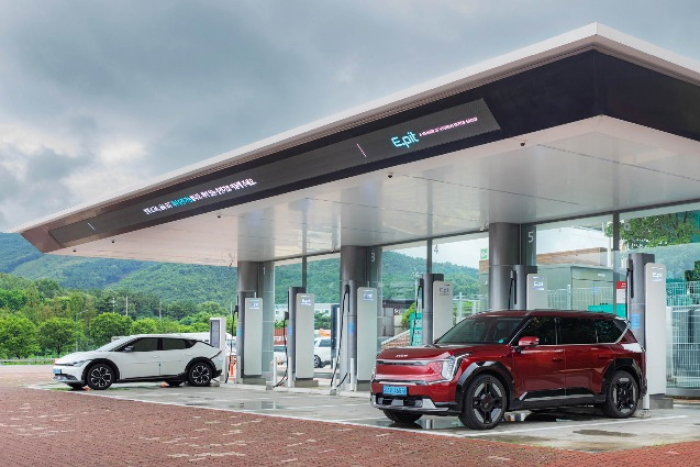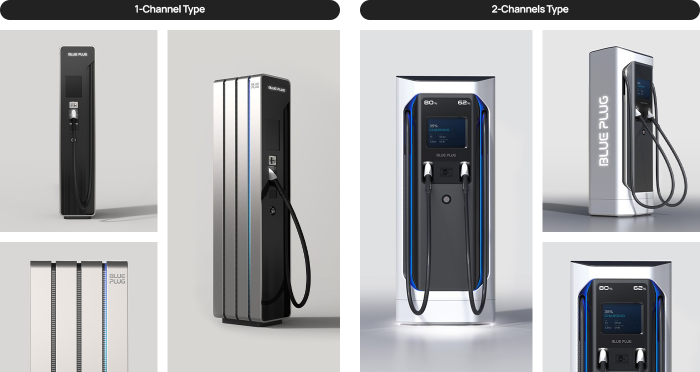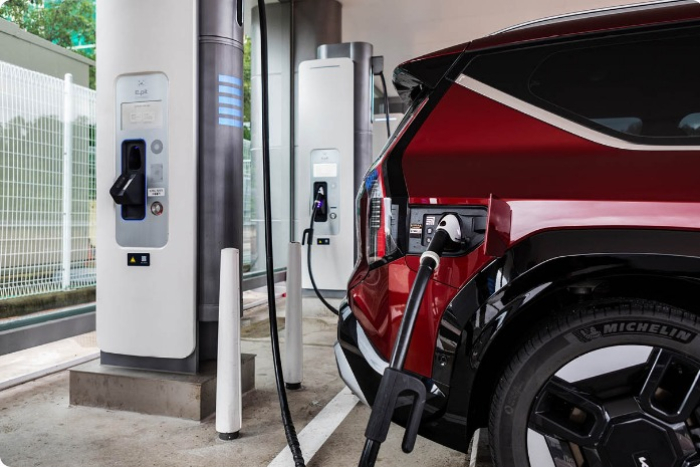Electric vehicles
Hyundai Motor to self-develop EV chargers to slow Tesla’s ascent
The S.Korean auto giant currently runs 36 EV charging stations across Korea versus Tesla’s 106 stations
By Aug 28, 2023 (Gmt+09:00)
3
Min read
Most Read
LG Chem to sell water filter business to Glenwood PE for $692 million


KT&G eyes overseas M&A after rejecting activist fund's offer


Kyobo Life poised to buy Japan’s SBI Group-owned savings bank


StockX in merger talks with Naver’s online reseller Kream


Meritz backs half of ex-manager’s $210 mn hedge fund



Hyundai Motor Group will develop ultra-fast electric vehicle chargers with its proprietary technology to catch up to the world’s No. 1 EV maker Tesla Inc., which has rapidly advanced into the Korean EV charging market with its Superchargers.
According to the EV charging industry on Sunday, Hyundai Kefico Corp., an engine and transmission parts-making unit under Hyundai Motor Group, is seeking to get its super-fast chargers with a power output of 350 kilowatts (kW) certified with the Korean government to debut them in the market within this year.
The company announced its foray into EV charger development in October last year, and it is expected to provide its Blue Plug chargers to Hyundai Motor Group’s own EV charging stations across the nation once its chargers are certified.
The Korean auto giant in March 2021 unveiled a plan to build high-speed EV charging stations under the E-pit brand to accelerate the penetration of its electric cars in Korea.
At that time, it vowed to install a total of 120 ultra-fast chargers at its E-pit charging stations by the end of 2021.
However, the addition of E-pit stations has been slow. The number of E-pit stations has only increased to 36 now across Korea from 12 in April 2021.
Over the same period, Tesla’s Supercharger stations jumped to 106 from 33 in the county.

PREMIUM BRANDING HURDLE TO PENETRATION
Hyundai Motor has been promoting E-pit stations as premium charging stations to differentiate them from rivals.
Each E-pit station is equipped with four to six units of 350-kW chargers and requires its charger suppliers to use expensive materials to build high-end chargers.
Such a premium branding strategy has heightened charger building costs, preventing Hyundai Motor from finding suitable charger suppliers and becoming a major hurdle to the fast penetration of the E-pit stations across the country, an EV charging industry official said.
The construction cost of E-pit chargers is known to be more expensive than the average 150 million won ($113,000) needed to build an ordinary 350-kW charger.
SLOW THE ASCENT OF TESLA’S SUPERCHARGERS
While Hyundai Motor is grappling with the slow addition of its charging stations, Tesla is poised to cement its leadership in the Korean charging industry with Superchargers.
At the current pace, the gap between Hyundai Motor Group and Tesla could further widen in EV charging infrastructure construction.
With its own chargers, Hyundai Motor Group hopes to rein in Tesla’s ascent.

The Korean auto giant’s efforts to put the brakes on Tesla’s dominance continue on the global stage in the absence of a standardized EV charging system.
Hyundai Motor Co. and Kia Corp. in July announced its EV charger collaboration with BMW Group, General Motors, Honda Motor, Mercedes-Benz Group and Stellantis NV to set up at least 30,000 stations in the US.
According to Tesla, it owns and operates the most extensive global fast-charging network in the world, with over 45,000 Superchargers.
SK Signet Inc., an EV charger developer under SK Group, and EVSIS Co. under Lotte Group currently provide high-speed chargers to E-pit stations in Korea.
As Hyundai Kefico will likely join them, Daeyoung Chaevi, which had operated E-pit systems and offered E-pit chargers, has recently ended its one-year partnership with Hyundai Motor.
Write to Nan-Sae Bin at binthere@hankyung.com
Sookyung Seo edited this article.
More to Read
-
 Electric vehiclesHyundai Motor eyes EV charger alliance in US to take on Tesla
Electric vehiclesHyundai Motor eyes EV charger alliance in US to take on TeslaJul 27, 2023 (Gmt+09:00)
2 Min read -
 AutomobilesNo subsidy, no problem: Hyundai, Kia make top 10 US list for EV sales
AutomobilesNo subsidy, no problem: Hyundai, Kia make top 10 US list for EV salesJul 24, 2023 (Gmt+09:00)
1 Min read -
 Business & PoliticsKorea’s new EV subsidy plan favors Hyundai over Tesla, other imports
Business & PoliticsKorea’s new EV subsidy plan favors Hyundai over Tesla, other importsFeb 03, 2023 (Gmt+09:00)
4 Min read -
 Electric vehiclesTesla sweeps local EV subsidies as Korean firms at disadvantage in US
Electric vehiclesTesla sweeps local EV subsidies as Korean firms at disadvantage in USAug 22, 2022 (Gmt+09:00)
3 Min read -

-
 BatteriesHyundai to build ultra-fast EV charging infrastructure under E-pit brand
BatteriesHyundai to build ultra-fast EV charging infrastructure under E-pit brandMar 23, 2021 (Gmt+09:00)
2 Min read
Comment 1
LOG IN


